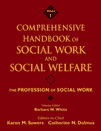Immigrant and Indigenous Populations: Special Populations in Social Work
Abstract
The social work profession has an historical commitment to address the needs of clusters of individuals, families, or communities designated by a majority of members in society to be the recipients of stigmatization, prejudice, and discrimination. Struggling along a continuum of assimilation and acculturation, the unique characteristics, culture, and voices of immigrant and indigenous people are underscored as emergent special populations deserving of focused understanding, research, and competent interventions. The concepts of special intelligence, historical trauma, ancestral memory, collectivity, and supraorganic structure are underscored in providing descriptive accounts of emerging paradigms for research and practice. The often overlooked elements of protocol and respect in the conduct of research involving these special populations are highlighted to call attention to social work's historical but often conflicted world view which has roots in the narratives of colonialism. The research strategies of storytelling, testimonials, celebrating survival, and community transformation associated with decolonizing methodologies are introduced to guide future research and intervention with these populations.



